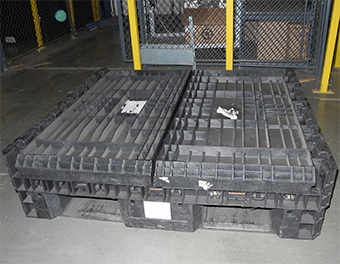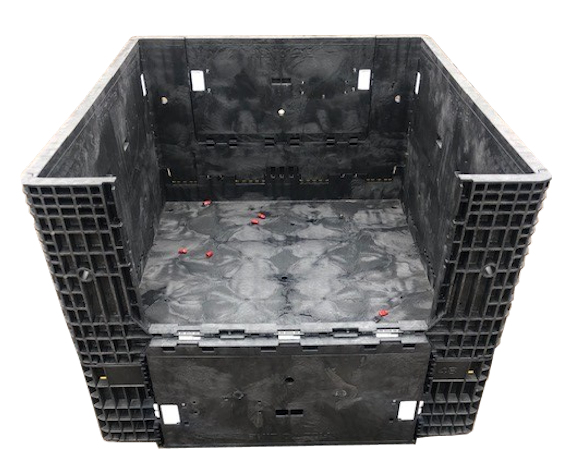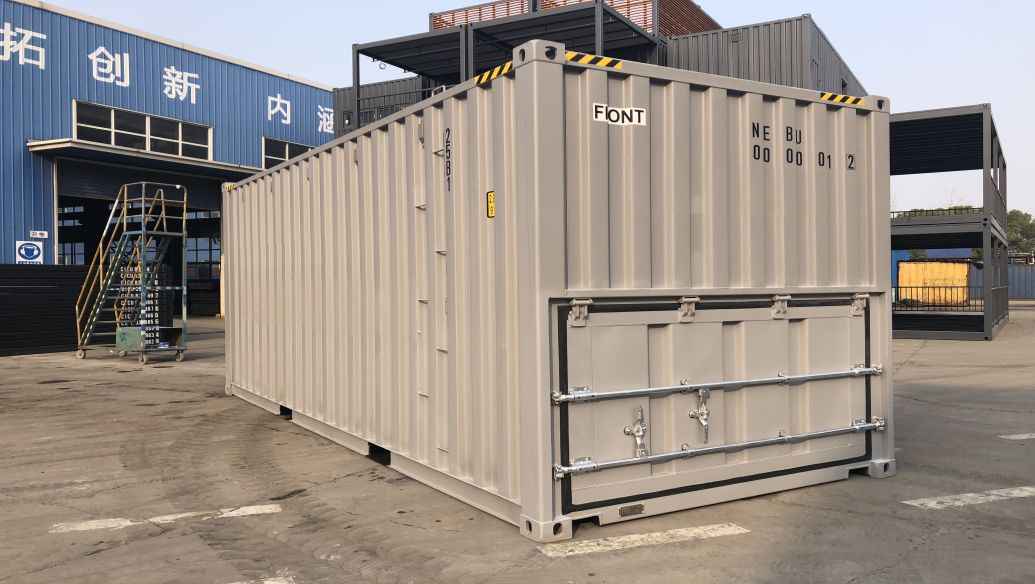Discover durable solutions with used plastic containers for safe storage
Wiki Article
Why Mass Containers Are Vital for Cost-efficient and lasting Transport
Mass containers play a vital role in modern logistics. They facilitate the effective movement of big amounts of items, thereby maximizing transportation processes. This method not only decreases costs however likewise minimizes environmental effect via lower discharges and waste generation. As markets look for more lasting methods, the adoption of bulk containers is ending up being significantly substantial. What ramifications does this shift hold for future logistics and supply chain management?
The Advantages of Utilizing Mass Containers in Logistics
Bulk containers revolutionize logistics by improving effectiveness and sustainability. These containers allow for the transport of big quantities of goods in a solitary trip, considerably decreasing the variety of journeys needed. This not only improves operations yet additionally lessens labor expenses related to handling, filling, and discharging. On top of that, mass containers are designed to enhance space use within transportation vehicles, making certain that even more products can be delivered at the same time.The standardization of bulk containers also streamlines the logistics procedure. With uniform measurements, they can be easily stacked and kept, causing improved storehouse management. Bulk containers often feature long lasting materials that shield components from damages throughout transit, therefore reducing item loss and increasing general reliability. Because of this, organizations can experience enhanced supply chain efficiency, ultimately causing increased earnings and consumer contentment. This mix of factors makes bulk containers a crucial property in contemporary logistics.
Ecological Influence: Minimizing Waste and Carbon Impact
As industries increasingly focus on sustainability, the fostering of bulk containers has actually arised as a crucial technique for minimizing waste and decreasing carbon impacts. These containers reduce the usage of product packaging materials, such as boxes and plastic, thus especially lowering overall waste generation. By consolidating deliveries, bulk containers improve transport effectiveness, permitting even more products to be transferred per journey. This decrease in journeys directly correlates with reduced greenhouse gas exhausts, adding to a smaller sized carbon footprint.Moreover, bulk containers can commonly be recycled or recycled, additionally mitigating ecological influence. The durability of these containers guarantees they can stand up to numerous transport cycles, lowering the demand for single-use options. used collapsible bulk containers. By simplifying logistics and promoting reliable resource use, mass containers not just sustain sustainable techniques but additionally encourage sectors to straighten with worldwide ecological objectives. Ultimately, their implementation reflects a commitment to eco-friendly stewardship and liable resource administration
Cost Financial Savings: How Bulk Containers Lower Transportation Costs
While many companies seek methods to improve their bottom line, the use of mass containers offers a significant opportunity for lowering transportation expenditures. Bulk containers maximize the quantity of goods transported, allowing companies to deliver bigger quantities simultaneously. This effectiveness reduces the number of trips required, straight lowering fuel costs and lessening labor expenses related to loading and unloading.In addition, bulk containers usually include streamlined layouts that enhance space usage within transport lorries. This indicates less voids, bring about a lot more efficient use offered capacity. The longevity of bulk containers can decrease the threat of product damage throughout transit, reducing losses and guaranteeing that even more items show up undamaged.
Enhancing Supply Chain Effectiveness With Mass Storage Space Solutions
Mass storage remedies play a vital function in enhancing supply chain effectiveness by enhancing stock monitoring. By settling goods right into fewer, bigger containers, services can considerably minimize taking care of costs connected with frequent transfers and handling. This streamlined technique enables for far better monitoring and management of inventory, eventually leading to improved operational efficiency.Streamlined Stock Management
Reliable inventory management is necessary for optimizing supply chain operations, especially when companies embrace bulk storage solutions. These options enable services to keep higher supply degrees while reducing the frequency of replenishment. By combining products into mass containers, firms can simplify their stock procedures, lowering the intricacy associated with tracking multiple smaller plans. This approach helps with precise inventory matters and boosts forecasting precision, allowing for even more informed decision-making. On top of that, mass storage space services streamline storehouse organization, making it less complicated to locate and accessibility items when required. Therefore, companies can attain an extra effective supply turn over rate, inevitably enhancing total supply chain performance and reducing the possibility of stockouts or overstock situations.
Decreased Handling Expenses
The application of mass storage space solutions not just enhances stock monitoring but likewise substantially lowers managing prices throughout the supply chain. By settling materials into mass containers, business minimize the need for frequent handling and transfer between different storage and transport devices. This technique reduces labor prices connected with loading, dumping, and moving smaller packages. In addition, mass storage space minimizes the frequency of deliveries, resulting in lower transportation expenses and decreased fuel consumption. Therefore, organizations can optimize their logistics procedures, allowing for a more effective allocation of sources. Eventually, reduced dealing with prices add to boosted overall supply chain efficiency, cultivating an atmosphere that supports both sustainability and economic practicality.
Flexibility of Bulk Containers Across Different Industries
Several markets have distinct demands for transport and storage space, bulk containers have arised as a versatile remedy that satisfies a wide range of demands. These containers, ranging from big containers to specialized storage tanks, can accommodate diverse materials, consisting of fluids, granules, and powders. In the agricultural field, mass containers promote the transport of plant foods and grains, while the food and drink industry uses them for active ingredients and ended up products. The chemical market counts on mass containers for safely transporting unsafe products, making certain conformity with security laws. Furthermore, building and construction firms profit from mass containers for transferring accumulations and other products. Their versatility expands to various modes of transport, including ships, vehicles, and trains, boosting logistical effectiveness. This adaptability not just simplifies procedures across various industries yet additionally advertises sustainability by minimizing packaging waste and optimizing area in transportation. Bulk containers play an essential role in modern-day supply chain monitoring.Future Trends in Mass Container Usage and Sustainability
The future of bulk container usage is increasingly shaped by ingenious products development that boosts sustainability. Additionally, automation in logistics assures to enhance operations, reducing waste and improving effectiveness. Accepting circular economic situation practices will better change just how bulk containers are made, utilized, and reused, cultivating a much more sustainable transportation landscape.Cutting-edge Materials Advancement
As industries progressively prioritize sustainability, ingenious materials growth in mass containers emerges as a substantial variable in improving environment-friendly transport remedies. Makers and researchers are checking out biodegradable plastics, recycled composites, and light-weight metals to decrease environmental effect. These materials not just reduce waste but also enhance fuel effectiveness by lowering the general weight of containers. Furthermore, developments in smart materials, which can adjust to varying conditions, boost the longevity and performance of mass containers. The combination of these ingenious products aligns with circular economic situation principles, advertising reuse and recycling. As the demand for lasting practices grows, the growth of such materials will play a crucial duty fit the future of bulk container usage in logistics and transportation.Automation in Logistics
Considerable advancements in automation are poised to transform logistics and the application of mass containers, improving sustainability in transport. Automated systems, including drones and independent vehicles, are simplifying the motion of bulk containers, decreasing the reliance on conventional fuel-powered transport. These modern technologies optimize directing and loading procedures, improving and decreasing empty miles fuel effectiveness. Additionally, automated stock management systems enhance tracking and tracking of mass containers, ensuring better resource allocation and decreased waste. The assimilation of the Net of Things (IoT) enables real-time data analysis, making it possible for aggressive decision-making that straightens with sustainability objectives. As automation remains to develop, it is anticipated to drive further technologies in bulk container usage, inevitably supporting even more lasting logistics techniques and minimizing the environmental impact of transportation.Round Economic Situation Practices
Advancements in automation are establishing the phase for an extra integrated technique to circular economic situation practices in the domain name of mass container use. As sectors significantly welcome sustainability, bulk containers are being developed for long life and reusability. This shift not only reduces waste yet also boosts source performance. Companies are taking on techniques such as closed-loop systems, additional reading where made use of containers are accumulated, refurbished, and reintroduced into the supply chain. Additionally, wise innovations track container life process, assisting in better management and decreasing environmental impact. The cooperation between producers, logistics suppliers, and end-users is vital in establishing criteria for sustainable container usage. used collapsible bulk containers. Future trends suggest an expanding emphasis on products that are eco-friendly and recyclable, more enhancing the circular economic situation's principles wholesale transportation
Frequently Asked Questions
What Products Are Bulk Containers Usually Made From?
Mass containers are commonly built from resilient materials such as high-density polyethylene, steel, cardboard, and aluminum. These products supply security, stamina, and flexibility, making them ideal for transferring different my response products in various sectors efficiently.Just how Do I Select the Right Dimension Mass Container?
Selecting the right dimension bulk container involves reviewing the quantity of materials to be carried, considering taking care of tools compatibility, and evaluating storage room needs. Proper size assurances performance in transportation and reduces waste during delivery.Are Mass Containers Reusable or Recyclable?
Bulk containers are typically reusable, created for numerous trips, enhancing sustainability. Lots of can likewise be reused, relying on the materials used. Choosing recyclable alternatives better sustains environmental goals and lowers waste in transportation techniques.What Security Rules Put On Mass Container Transportation?
Security regulations for mass container transportation consist of conformity with the Department of Transportation standards, proper labeling of dangerous products, structural honesty assessments, and adherence to weight limitations to ensure risk-free handling and avoid accidents throughout transportation.How Can Services Transition to Using Mass Containers Efficiently?
Services can alter to bulk containers by reviewing existing logistics, educating personnel on handling, investing in appropriate devices, maximizing supply management, and Get the facts collaborating with suppliers to guarantee compatibility and effectiveness throughout the supply chain.
As industries increasingly focus on sustainability, the fostering of bulk containers has actually emerged as a vital approach for reducing waste and reducing carbon impacts. By settling materials into bulk containers, companies can simplify their inventory processes, decreasing the complexity linked with tracking several smaller plans. As sectors significantly focus on sustainability, ingenious products advancement in mass containers arises as a considerable factor in enhancing environment-friendly transportation services. Automated systems, consisting of drones and autonomous lorries, are enhancing the activity of bulk containers, minimizing the dependence on traditional fuel-powered transportation. In addition, automated supply administration systems boost tracking and surveillance of mass containers, ensuring far better source allotment and minimized waste.
Report this wiki page